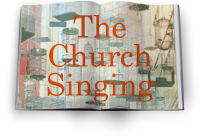10 Questions Every Pastor Should Ask about Their Church’s Music
We owe an incalculable debt of gratitude to Gilbert Lennox, Bob Lockhart, Alan Wilson, Alistair Begg, and Jim Thomas (and their wives), who have been our pastors from childhood onwards in the five different cities where we have lived. They have taught us, inspired us, held us accountable, prayed for us, championed our work, and given us the benefit of the doubt on more occasions than we deserve. If you are reading this chapter and you are not a pastor, it’s important to remember that there is no place in authentic Christian ministry for anyone who does not seek to honor, serve, love, and pray for their leaders (as tricky as that can be for all of us creative personalities).
The one thing we have learned above all others as we have traveled with our music these last ten years is this: Good congregational singing begins with the pastoral leadership.
Whatever the denomination, musical style, or cultural background, the singing is directly proportional to the senior pastor’s or leadership team’s care for the subject. It is not primarily the music, or the musical leadership, or the budget. Just like parents can’t blame their child’s ballet teacher if she behaves badly through the week, so the leader of the church, and not the music leader or team, is ultimately responsible for how well the congregation is singing.
With that in mind, here are 10 questions we encourage every pastor to ask.
1. Does my congregation know why they sing?
Since congregational singing is something we are created to do by God, commanded to do in God’s Word, and compelled to do by the gospel of God, then you need to teach about it. It is ultimately your responsibility to see that this aspect of our worship is explained, nourished, and celebrated. And as it is an area where there has been such a lack of clarity in the last generation, churches need their pastor to teach clearly and positively about it, as well as explain that singing is not a branding exercise, a warm-up for the “main event” of the sermon, nor a means to creating an emotional sensation. That may be through a sermon series, a study series for groups in the church, or a clearly written summary document that church members read and keep. We recommend all three!
2. Is our church singing strong songs?
Ultimately, great songs are sung well. Find, or ensure others are hunting out, infectious and emotional melodies combined artistically, in which the wonders of the Lord are described in sung poetry in a way your church just can’t wait to sing. Every time you sing one of those types of songs, your congregation will grow in their joy of and commitment to singing together. Every time you sing a song that isn’t strong, your congregation’s singing drops and people’s enthusiasm is diminished. Teaching new songs is important and they should be taught well; but, repeating good songs people have loved and known for a long period of time really encourages confidence.
If you’re serving a smaller church that struggles in its singing, we suggest simplicity and depth by building a small canon of Word-filled songs that your church sings really well and then growing slowly from there. Better to know fewer songs and sing them well, than to sing a wide breadth of songs weakly.
3. Am I part of the weekly song selection process?
Whether you choose the songs, are actively involved in the process, or simply have clear direction and oversight, it is really important that you know what’s going on. After all, the songs are often what your people will go home remembering and repeating (however great your sermon is!). Music may not be an area of expertise for you, but love your congregation enough to care what they are singing.
4. Am I overseeing the overall selection or “canon” of songs?
In the online generation, it is possible for us to write a song, put it online, and then have it used in six continents that weekend. While this has strengths, it means the pool of songs is often larger than previous generations, and that there is less accountability over their creation and an inbuilt tendency to favor what’s new simply because it’s new.
This also means that, if songs are chosen one by one and simply on their own merits, churches can end up with a narrow range of songs in terms of their depth and breadth theologically. Ensure that your church’s song list includes hymns and songs that touch on all the major doctrines and seasons of life, just as the Psalms and historical hymnals do.
5. Am I passionately involved in the singing?
The great Welsh preacher of the last century, Martyn Lloyd-Jones, insisted on personally leading the pastoral prayer week to week because he took modeling prayer to his congregation so seriously. We’d argue that this sort of care should be given to the singing as well, not necessarily with a microphone on, or even at the front, but singing visibly before the congregation.
A pastor who seems distracted or half-hearted, or who indeed is often not even in the room, is telling his congregation that singing is not that important to him. Sing to your people. Be present, be engaged, and be passionate. If you are not, then they will not be either.
6. Am I leading, encouraging, teaching, and building strong relationships with all the musicians?
When a pastor pours into his lead musicians, they become more informed, more in step with the vision and mission of the church, and often much more creative and energized in what they do. Encouragement is oxygen to the creative soul.
A church music department left unchecked can become like a monster in a church, wielding too much influence and causing a lot of grief. It is not healthy for the whole congregation or for the musicians themselves if the relationship between the pastor(s) and them is not operating well.
In church leadership it is always tempting to avoid hard conversations, and there is oftentimes no one more difficult for a pastor than lead musicians, who tend to be popular, strong, and emotional. But those conversations need to happen or everybody suffers. When music directors and their pastors form deep, committed, trusting, robust, and mutually respectful working partnerships, the opportunity for ministry is incalculable.
7. Do I regularly encourage the congregation in their singing?
Give your congregation encouragement. Week by week, help grow the congregation’s confidence, and listen out for their voices. If you are leading the service, give short reflections on aspects of what has been or is about to be sung, and encourage your flock to sing to one another as an expression of their gospel unity. Tell the stories of the songs you are singing from time to time. And encourage the church’s gratitude for and support of the music team.
8. Am I encouraging the congregation to prepare for Sunday services?
Encourage individuals to be praying about what they will do on Sunday; encourage families to have bulletins or hymnbooks or some resource that teaches them the gospel in their home life; and encourage them to sing together. Promote listening to songs on smartphones and at home in everyday life. Email song lists, send links to YouTube videos and sheet music, and so on.
9. Am I planning the service order in a sensitive and creative way?
In all art, the order and timing of everything can enhance the meaning and beauty of the experience, or it can obscure it—and a church service is no different.
The overall arc of a service should help shape our understanding of the gospel—the greatness of God, the wonder of forgiveness in Christ through the repentance of our sin, and our prayers for the growth of Christ’s kingdom in our lives and the world.
The beginning of the service should help establish the singing. Pentecostal traditions often sing continuously for forty minutes or more at the start of a service—while that may be a culture shock for your church, the principle of starting with familiar songs, or even doing pre-service singing, is well worth considering. We also recommend using your song choices to enhance the message of the passage and the focus of the preached message, especially in terms of singing in response at the end of the service.
10. Am I overseeing the development of singing in congregational life?
Part of the vision for your church should include how you would love to see the singing develop. Keep the leadership team accountable to these goals. If you show intentionality and care about the singing in your church, sooner or later everyone else will (and vice versa).
This might also mean figuring out when the whole church can sing together, all age groups. For example, both of our home churches (in Belfast and in Nashville) include the children in the first part of the singing in the main worship service.
And finally . . . for one year, make the first question you ask about music at the weekly church review meeting: “How did the congregation sing?”
* * * * *
Editor’s note: This article is an excerpt from the Gettys’ upcoming book Sing!: How Worship Transforms Your Life, Family, and Church.









